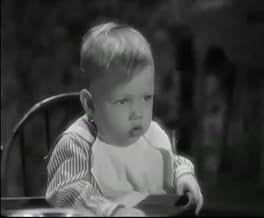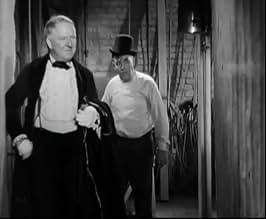Adicionar um enredo no seu idiomaThe Great McGonigle and his troupe of third-rate vaudevillians manage to stay one step ahead of the bill collectors and the sheriff.The Great McGonigle and his troupe of third-rate vaudevillians manage to stay one step ahead of the bill collectors and the sheriff.The Great McGonigle and his troupe of third-rate vaudevillians manage to stay one step ahead of the bill collectors and the sheriff.
- Direção
- Roteiristas
- Artistas
- Prêmios
- 2 vitórias no total
- Girl in Audience
- (não creditado)
- Mr. Livingston
- (não creditado)
Avaliações em destaque
Because Fields was in his mid-50s when he made this film he was able to turn the tables, in a sense: instead of reprising his real-life role as a starving young actor he'd graduated by this time to the role of the unscrupulous manager, known here simply as The Great McGonigle. McGonigle leads a ragtag troupe of players who are touring the hinterland in that ever-popular temperance warhorse, "The Drunkard." As our story begins this troupe is fleeing a town one step ahead of the sheriff, and heading for their next engagement in the village of Bellefontaine, where prospects don't look much better. In desperate need of cash, McGonigle is compelled to woo a local wealthy widow who aspires to the stage, the magnificently named Cleopatra Pepperday (played with appropriate magnificence by Jan Duggan), while in the meantime his daughter is wooed by a college boy who also dreams of performing. The boarding house where the troupe stays serves as the locale for two hilarious comic set-pieces, back-to-back: first, McGonigle's lunch is ruined by Mrs. Pepperday's rowdy toddler Albert, who flings food in his face, grabs his nose, and dunks his pocket watch in molasses. And then, as if he hadn't been punished enough already, McGonigle must listen to Mrs. Pepperday's spirited rendition of "The Sea Shell Song."
These two sequences alone are reason enough to make this movie a must-see comedy classic, and, interestingly, in each of them Fields himself plays victimized straight man: first to Baby LeRoy, then to Jan Duggan, whose rendition of the song is a show-stopping triumph. Fields' reactions to both of these characters are priceless, but it's also worth pointing out that in this instance the notoriously paranoid, cantankerous W.C. Fields, who was said to be deeply jealous of other comedians, generously shared the spotlight with not one but two fellow players -- one of whom was a baby! -- and permitted each to temporarily steal the spotlight, to the ultimate benefit of the project.
The movie's finale consists of the troupe's performance of "The Drunkard" plus a sentimental song or two, and, best of all, McGonigle's juggling act. This extended sequence feels like an authentic recreation of just what an evening at a small-town theater of the period would have been like, from the cheap-looking sets and declamatory acting styles to the heavy curtain that hits the stage with a crash after each scene. The juggling routine is a special treat, as it represents the most complete filmed record of Fields' legendary feats of legerdemain. My only complaint is that there are a few too many cut-away shots showing audience members' reactions; I'd have been perfectly happy to watch the whole routine in a couple of uninterrupted takes, with no reaction shots at all. But in any event, the juggling act is wonderful.
According to a recent biography of W.C. Fields by James Curtis The Old Fashioned Way suffered through a troubled gestation process. Just as the film was going into production Fields' original screenplay, entitled "Playing the Sticks," was found to be somewhat jumbled and too brief to sustain a feature-length movie. Apparently the savior of the project was an unheralded screenwriter named Jack Cunningham, then known primarily for his earlier work on Westerns such as The Covered Wagon and a couple of Douglas Fairbanks vehicles. It was Cunningham who reworked and expanded Fields' original script into the seamless story it became, and who chose to interpolate the sequences from "The Drunkard." He also persuaded Fields to dust off his old juggling act for the finale. If this background information is correct, then viewers owe a debt of thanks to Mr. Cunningham for his important contribution to this terrifically entertaining, funny, and nostalgic slice of theatrical Americana.
This is a period film and it goes back to the turn of the last century right about the time when a young juggler named W.C. Fields was going into vaudeville. The Old Fashioned Way offers us a rare treat to see Fields doing the juggling act which he started in show business with. I'm sure Fields drew from his experiences way back when to both write the original story on which the film is based and to give his usual good performance.
The film has a musical score of mostly old public domain standards, but the songwriting team of Mack Gordon and Harry Revel wrote a couple of original songs for the film. Gordon and Revel were with Paramount at the time, but would soon move to 20th Century Fox where they wrote a number of songs Alice Faye introduced. Morrison has a nice tenor voice and a pleasing, but somewhat limp personality. He does the best known song from the film, Poor Folk well with his tenor, but I have a bootleg radio recording of Russ Columbo doing it on one of his radio shows. Russ's baritone is far more suitable to the number than Morrison's tenor.
Still the show in this film is Fields and no one comes near stealing this film from him. Actress Jan Duggan plays the rich spinster who has stage ambitions and who Fields courts relentlessly, even putting himself through the torture of hearing her sing a really stupid song about gathering sea shells. Duggan would play Bill Fields's foil in several more film after The Old Fashioned Way.
Fans of the eternal Fields will like The Old Fashioned Way and if you see it you'll become a fan of W.C. Fields.
I saw "The Old Fashioned Way" about 30 years ago for the first time and, except for the juggling act and Baby Leroy scene, thought it was pretty innocuous. Of course, I was only a teenager back then and actually thought that "Billy Jack" was the greatest dramatic movie of the 20th century. I'm also ashamed to say that I thought Chevy Chase was actually funny. Ugh! As my tastes matured, I began to realize that so many aspects of life are beyond our control, and all one could ever hope to do was to learn not to take life so seriously. That, I believe, is why W. C. Fields' sense of humor is timeless and continues to relate to future generations.
The next time you watch a W. C. Fields movie, look closely and you may find certain aspects of yourself within Fields' character. Why do you think Homer Simpson has lasted so long??? If you take what has been said in this review into consideration, you will cherish this film for years to come. Fix yourself a dry Martini and enjoy the movie.
Você sabia?
- CuriosidadesW.C. Fields recreates his famous vaudeville juggling routine with the cigar boxes.
- Erros de gravaçãoBetty is described as the leading lady of the troupe--as one would expect, since she is The Great McGonigle's daughter. But she takes no part in the show; another actress plays the female lead.
- Citações
Dick Bronson: Mr. McGonigle, I've got to have some money.
The Great McGonigle: Yes, my lad, how much?
Dick Bronson: Two dollars.
The Great McGonigle: If I had two dollars, I'd start a number two company.
Dick Bronson: For two cents I'd quit.
The Great McGonigle: [to Marmaduke] Pay him off!
[Marmaduke gives him a two cent stamp]
- Cenas durante ou pós-créditosThe end credits are in 2 parts; the first contain the actors and their character names in the film as a whole; The second contains the actors and their character names in the play, "The Drunkard." Five actors, therefore, are credited twice: W.C. Fields, Joe Morrison, Judith Allen, Samuel Ethridge and Ruth Marion.
- ConexõesFeatured in Hollywood: The Gift of Laughter (1982)
- Trilhas sonorasWe're Just Poor Folks Rolling in Love
(1934) (uncredited)
Lyrics by Mack Gordon
Music by Harry Revel
Sung by Joe Morrison
Principais escolhas
Detalhes
- Data de lançamento
- País de origem
- Idioma
- Também conhecido como
- The Old Fashioned Way
- Locações de filme
- Empresa de produção
- Consulte mais créditos da empresa na IMDbPro
- Tempo de duração
- 1 h 11 min(71 min)
- Cor
- Proporção
- 1.37 : 1































